Iggy returns .. laughing to keep from crying on Canada and Quebec
Apr 27th, 2012 | By L. Frank Bunting | Category: In Brief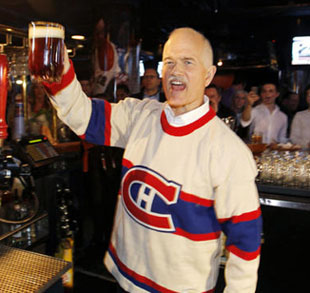 I had just waded through an even two dozen articles on Michael Ignatieff and his latest thoughts about what Pierre Trudeau’s book of 1968 called Federalism and the French Canadians.
I had just waded through an even two dozen articles on Michael Ignatieff and his latest thoughts about what Pierre Trudeau’s book of 1968 called Federalism and the French Canadians.
(Well … that’s not exactly true : the first of the two dozen was actually an article by Michael Ignatieff himself – a review of David Scheffer’s new book, All the Missing Souls: A Personal History of the War Crimes Tribunals, from the April 5, 2012 issue of the New York Review of Books. But the remaining 23 are all about Ignatieff’s recent interview with BBC Scotland, on parallels that may or may not exist between the Québécois and Scottish independence movements. I have listed all 24 articles in an Appendix, for those almost as crazy as I am.)
What I was trying to do here was summarize just what I have taken away from this exercise – apart from an immediate impulse to collapse into a heap of laughing to keep from crying on my second-storey back office floor.
At this point in my composition, however, I was called away to a meeting of the counterweights focus group, at Pauper’s Pub on the semi-fashionable part of Bloor Street in Toronto, west of Spadina and east of Bathurst. Inevitably the subject of Iggy’s return arose. And I joined in on the enthusiastic abuse of his latest pronouncements on his home and native land.
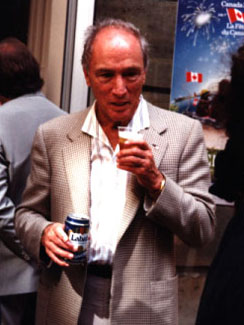 A reference to a particular newspaper article launched the focus group discussion: Chantal Hébert’s April 25 column in the Toronto Star, “Michael Ignatieff’s BBC comments on shaky ground.” I absolutely agree that this is an excellent piece, on several key reasons why “former Liberal leader Michael Ignatieff” was off the mark in “his depiction of Canada as a federation whose solitudes [between Quebec and the rest of Canada] had grown so far apart as to have little incentive to continue living together.” (And Ms. Hébert is herself, after all, a francophone resident of Quebec.)
A reference to a particular newspaper article launched the focus group discussion: Chantal Hébert’s April 25 column in the Toronto Star, “Michael Ignatieff’s BBC comments on shaky ground.” I absolutely agree that this is an excellent piece, on several key reasons why “former Liberal leader Michael Ignatieff” was off the mark in “his depiction of Canada as a federation whose solitudes [between Quebec and the rest of Canada] had grown so far apart as to have little incentive to continue living together.” (And Ms. Hébert is herself, after all, a francophone resident of Quebec.)
In a broadly similar vein, I had also been impressed myself by David Olive’s April 24 column in the same publication, “Ignatieff never has and never will understand Canada.” Mr. Olive began with: “Michael Ignatieff, forgotten but not gone, told the BBC in a documentary on Scottish nationalism broadcast Tuesday that Canada is a ‘very strange’ country whose French-English linguistic divisions will eventually destroy the Great White North.” And Mr. Olive’s last sentence advised: “Canadians in their wisdom last year hugely rejected an Ignatieff government. For Internet readers looking in from London to Jakarta, Michael Ignatieff’s thoughts on Canada should [be] given as much weight as the Dalai Lama’s assessment of Velveeta.”
Who asked him to come back anyway?
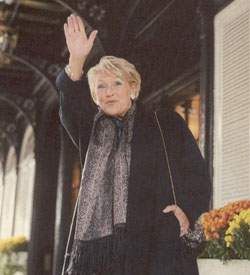 There is arguably nothing more fun than abusing some eminent public intellectual with focus group friends in a pub on a spring evening. It is especially easy to do when the public intellectual involved is nowhere in sight (even if Massey College at the University of Toronto, of which Michael Ignatieff is now a fellow, lies only a not unreasonable walk from Pauper’s Pub).
There is arguably nothing more fun than abusing some eminent public intellectual with focus group friends in a pub on a spring evening. It is especially easy to do when the public intellectual involved is nowhere in sight (even if Massey College at the University of Toronto, of which Michael Ignatieff is now a fellow, lies only a not unreasonable walk from Pauper’s Pub).
It is also especially apt if the intellectual in question richly deserves the abuse. And, say whatever else you like, Mr. Ignatieff’s long absence from the country of his birth does mean that he lacks much vital first-hand experience of the history of Canada over the past generation, on which he seems happy to pronounce such less than optimistic propositions, in the midst of so much misunderstanding of so many plain facts.
(Or as Chantal Hébert concluded: “Ignatieff has said that his BBC comments were taken out of context. There is no doubt his were the musings of a public intellectual and not those of a recent aspirant to the job of prime minister … But in either role, it would have been nice if his assertions had been borne out by more actual facts.”)
At the same time, as our counterweights focus group discussion finally vaguely alluded to as well last night, it must say something not entirely optimistic about Canada today that it has been so willing to welcome Michael Ignatieff back from his long sojourns in the United Kingdom and the United States, as a potential leader of the country.
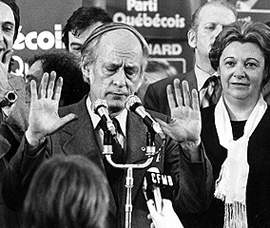 It is true enough, as David Olive says, that “Canadians in their wisdom last year hugely rejected an Ignatieff government.” But he did manage to finally become leader of the Liberal Party of Canada – and to attract a former Jean Chretien political staffer of considerable repute to work for him (a subject on which I can also remember Chantal Hébert commenting positively not all that long ago now too).
It is true enough, as David Olive says, that “Canadians in their wisdom last year hugely rejected an Ignatieff government.” But he did manage to finally become leader of the Liberal Party of Canada – and to attract a former Jean Chretien political staffer of considerable repute to work for him (a subject on which I can also remember Chantal Hébert commenting positively not all that long ago now too).
The voters of Etobicoke-Lakeshore in Toronto similarly returned Michael Ignatieff as their representative in the Canadian House of Commons twice, in the elections of 2006 and 2008. And, I must confess that when it finally seemed he was going to be the leader of the main party of progress in the country I, like others, tried to think somewhat highly of him myself, despite all my earlier misgivings!
The very strange country of Michael Ignatieff’s birth
 When you get right down to it, I think, this is more or less the point Ignatieff himself was trying to make about the “very strange” country of his birth. And in between the lines of all his sophomoric assertions about the longstanding federal-provincial division of powers on such subjects as education and natural resources in Canada, Michael Ignatieff was saying something to BBC Scotland that is not totally off the wall.
When you get right down to it, I think, this is more or less the point Ignatieff himself was trying to make about the “very strange” country of his birth. And in between the lines of all his sophomoric assertions about the longstanding federal-provincial division of powers on such subjects as education and natural resources in Canada, Michael Ignatieff was saying something to BBC Scotland that is not totally off the wall.
(He is after all still someone whom the likes of the editors of the New York Review of Books still choose to appear in their eminent pages. And even someone whom the BBC – an organization once profoundly admired in certain English-speaking Canadian circles – sees fit to ask for learned commentary, even if many of we Canadians would agree with David Olive that this is not all that well advised, where Canada itself is involved.)
There are in fact a number of articles on my list of 24 below that have vaguely supportive things to say about Ignatieff’s BBC Scotland interview. I would just single out two of them, as at least gentle counterweights to the Chantal Hébert and David Olive pieces noted above.
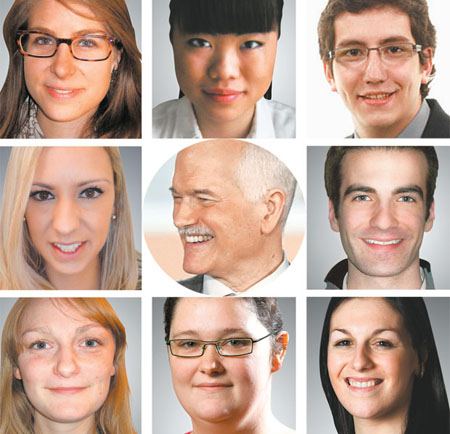 The first is an April 25 column in the Vancouver Sun by Barbara Yaffe (that also alludes to this week’s Alberta provincial election), “Defeat of Wildrose does not eliminate threats to national unity.” Ms. Yaffe has written, and wisely enough in my view: “People are preoccupied with issues other than keeping the country together, while the federal government is virtually ignoring Quebec … Former Liberal leader Michael Ignatieff raised eyebrows this week for telling a British interviewer that Quebec could one day separate … ‘The problem here is that we don’t have anything to say to each other any more,’ declared Ignatieff, now a University of Toronto academic. ‘There’s a kind of contract of mutual indifference’ … His statement may have been impolitic and controversial, but it also was accurate. Quebecers these days don’t demand much from the rest of Canada beyond cheques. When there’s disagreement – as with a battle with Ottawa over preserving gun registry data or a national securities regulator – it pursues its case in the courts … Had Alberta anointed a Wildrose government this week, the unity situation would have been aggravated – but not much more than it is already.”
The first is an April 25 column in the Vancouver Sun by Barbara Yaffe (that also alludes to this week’s Alberta provincial election), “Defeat of Wildrose does not eliminate threats to national unity.” Ms. Yaffe has written, and wisely enough in my view: “People are preoccupied with issues other than keeping the country together, while the federal government is virtually ignoring Quebec … Former Liberal leader Michael Ignatieff raised eyebrows this week for telling a British interviewer that Quebec could one day separate … ‘The problem here is that we don’t have anything to say to each other any more,’ declared Ignatieff, now a University of Toronto academic. ‘There’s a kind of contract of mutual indifference’ … His statement may have been impolitic and controversial, but it also was accurate. Quebecers these days don’t demand much from the rest of Canada beyond cheques. When there’s disagreement – as with a battle with Ottawa over preserving gun registry data or a national securities regulator – it pursues its case in the courts … Had Alberta anointed a Wildrose government this week, the unity situation would have been aggravated – but not much more than it is already.”
My second case in point here is another April 25 column, this time by John Ivison in the National Post. This brings another kind of perspective again to the issue, that of the immigrant new Canadian (albeit from a part of the world once regarded in Canada as even less “foreign” than the neighbouring United States). Mr. Ivison’s piece is entitled “Michael Ignatieff has a point about Quebec separation.” And he writes that the Canadian response to Iggy’s BBC interview “was damning, not least from Mr. Ignatieff’s old friend, interim Liberal leader Bob Rae, who called the analysis ‘factually incorrect’ and ‘completely wrong’ … Mr. Ignatieff claims his comments were taken out of context and he is right. It’s doubtful if many of the people who were quick to anger actually watched his 10-minute interview in full. I did – and as a Canadian and Scotsman, the process he described is self-evident … Loath as I am to make predictions in the wake of the Wildrose pundit/pollster omni-shambles, it looks safe to suggest the tensions in the Canadian federation will be stretched to snapping point in the coming years … It is hard to see what more Canada can do for la belle province, beyond a fond kiss and the blessing to sever.”
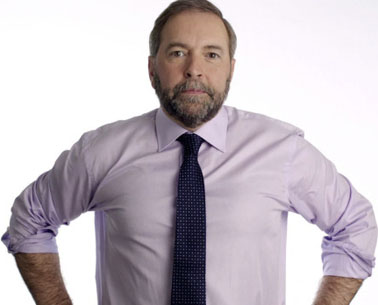 I don’t finally agree myself with Mr. Ivison’s assessment – and certainly not in the way that I do think Barbara Yaffe is saying something interesting. Chantal Hébert points to Thomas Mulcair and a new federal New Democratic Party with the current majority of its members from Quebec as at least some potential light at the end of the tunnel. And I think that makes a lot of sense. David Olive is pointing out that a key problem with Michael Ignatieff from the start of his Canadian political career was just that he had spent so little of his adult life learning about Canada – which is clearly a strange country with many underlying “constitutional” problems. And I agree with this. I agree too with our focus group member last night who said he has concluded that Ignatieff wanted to be prime minister of Canada strictly out of vanity – and not because he had any ideas about Canada or anything else that he wanted to put into practice, etc. Canadians were wise to turn him down (even if not so wise in putting quite so much faith in Stephen Harper!)
I don’t finally agree myself with Mr. Ivison’s assessment – and certainly not in the way that I do think Barbara Yaffe is saying something interesting. Chantal Hébert points to Thomas Mulcair and a new federal New Democratic Party with the current majority of its members from Quebec as at least some potential light at the end of the tunnel. And I think that makes a lot of sense. David Olive is pointing out that a key problem with Michael Ignatieff from the start of his Canadian political career was just that he had spent so little of his adult life learning about Canada – which is clearly a strange country with many underlying “constitutional” problems. And I agree with this. I agree too with our focus group member last night who said he has concluded that Ignatieff wanted to be prime minister of Canada strictly out of vanity – and not because he had any ideas about Canada or anything else that he wanted to put into practice, etc. Canadians were wise to turn him down (even if not so wise in putting quite so much faith in Stephen Harper!)
Yet in the very end I think I’d say give Ignatieff some credit for learning something about Canada since he came back. What he has learned is that this is a very strange country indeed. Canada in the early 21st century remains something of a tentative political construct. It needs more work of the sort that Trudeau began with the Constitution Act, 1982, and that Brian Mulroney tried to carry on with the failed Charlottetown Accord of 1992. And it is distressing that so many in Canadian positions of power and authority at this moment seem to have given up altogether on trying to move further ahead on this front.
 What Michael Ignatieff has not yet learned, I think, is that a great many Canadian people already know this – and are ready to take the next step. Strangely enough, this includes a great many people of Quebec. And Chantal Hébert is surely right when she urges that the decision of so many people of Quebec to vote NPD in this past May 2, 2011 federal election is a potentially very interesting case in point. And the more recent election of Thomas Mulcair from Quebec as federal NDP/NPD leader – great grandson of the late 19th century Quebec nationalist premier Honoré Mercier, who combined with the Ontario Liberal premier of the day Oliver Mowat, in what the anglophile press criticized as the “Mowat-Mercier Concordat” – is another optimistic sign, etc, etc, etc. Yet it probably is a little unfair, in the very end, to criticize Michael Ignatieff too strongly for not having learned this yet when, as Barbara Yaffe implies, so many other Canadian politicians who do not suffer from Ignatieff’s learning disabilities are giving so little sign of having learned it themselves!
What Michael Ignatieff has not yet learned, I think, is that a great many Canadian people already know this – and are ready to take the next step. Strangely enough, this includes a great many people of Quebec. And Chantal Hébert is surely right when she urges that the decision of so many people of Quebec to vote NPD in this past May 2, 2011 federal election is a potentially very interesting case in point. And the more recent election of Thomas Mulcair from Quebec as federal NDP/NPD leader – great grandson of the late 19th century Quebec nationalist premier Honoré Mercier, who combined with the Ontario Liberal premier of the day Oliver Mowat, in what the anglophile press criticized as the “Mowat-Mercier Concordat” – is another optimistic sign, etc, etc, etc. Yet it probably is a little unfair, in the very end, to criticize Michael Ignatieff too strongly for not having learned this yet when, as Barbara Yaffe implies, so many other Canadian politicians who do not suffer from Ignatieff’s learning disabilities are giving so little sign of having learned it themselves!
Appendix
APRIL 5 – We’re So Exceptional … April 5, 2012 … Michael Ignatieff … All the Missing Souls: A Personal History of the War Crimes Tribunals … by David Scheffer … Princeton University Press, 533 pp., $35.00
APRIL 23 – Ignatieff warns of Canadian breakup … Former Liberal leader Michael Ignatieff says Quebec will renew its push for separation if Scotland achieves independence from Britain in a looming referendum.
APRIL 23 – Ignatieff gives gloomy diagnosis on Canadian unity … “I can’t think of this country without Quebec. Je parle francais. And when I think about being a Canadian, speaking French is part of it,” Ignatieff said … “But that’s not the way most English Canadians now think of their country. They might have done 30 or 40 years ago, when we thought we could live together in this strange hybrid country called Canada … “Now effectively, we’re almost two separate countries.” … There was no immediate comment from the Liberal party but Prime Minister Stephen Harper did issue a terse reaction through a spokesman … “As the prime minister said in his speech to the Conservative convention in 2011, we believe in a strong, proud and autonomous Quebec within a united Canada,” said the statement.
APRIL 23 – A year after seeking to become Canada’s PM, Ignatieff warns of national split
APRIL 24 – Ignatieff never has and never will understand Canada: Olive
APRIL 24 – Ignatieff insists remarks on Quebec were taken out of context … Ms. Marois concluded that to have a prominent federalist arrive at the same conclusion as herself was another sign that her cause was just. “We have been convinced for years. But I would say that history is moving quickly….Mr. Ignatieff is a prominent intellectual and I am pleased to hear him say these things.”
APRIL 24 – LETTER TO THE EDITOR … Quebec separation: Michael Ignatieff responds … If any of these themes — which I have believed all my life —failed to make their way into my interview with the Scottish broadcasters, I can only reaffirm them now to my federalist friends across Canada and repeat that I will never betray the cause that we share.
APRIL 24 РIgnatieff souhaite que le Qu̩bec reste au sein du Canada
APRIL 24 – Michael Ignatieff backtracks on controversial comments on Quebec
APRIL 24 – Barbara Kay: Michael Ignatieff hands Quebec separatists an unexpected gift … Michael Ignatieff, former leader of the party of Pierre Elliott Trudeau, contender for the leadership of Canada — including Quebec — it will be duly noted, has officially accepted the idea of Canada’s breakup with total sangfroid and equanimity. Oh, of course he backtracked later in the interview to say “it is my fervent hope that separatists are defeated,” but that rings a little hollow from someone who has just handed those same separatists a metaphorical bunker buster.
APRIL 24 – Ignatieff’s quote on Quebec separation sparks strong reaction … Former Liberal leader told Scottish BBC that “eventually” Quebec may be headed for independence
APRIL 24 РInd̩pendance du Qu̩bec: les propos de Ignatieff surprennent
APRIL 24 – Indépendance du Québec: Charest surpris des propos d’Ignatieff
APRIL 24 – Ignatieff craint la rupture du pays
APRIL 25 – Defeat of Wildrose does not eliminate threats to national unity … People are preoccupied with issues other then keeping the country together, while the federal government is virtually ignoring Quebec … By Barbara Yaffe
APRIL 25 – Ignatieff’s bon/wrong mots
APRIL 25 – Michael Ignatieff’s BBC comments on shaky ground … Chantal Hébert
APRIL 25 – John Ivison: Michael Ignatieff has a point about Quebec separation
APRIL 25 – Ignatieff clarifies Quebec stance … Says separation not inevitable … By: Joan Bryden …Â Michael Ignatieff has clarified he doesn’t actually believe Quebec’s secession from Canada is inevitable … The former Liberal leader was forced to backpedal Tuesday after his prediction of Canada’s eventual breakup was repudiated by federalist allies, the party he used to lead and, most directly, by his former college roommate, old friend and erstwhile leadership rival Bob Rae … “Nothing is inevitable in politics and nothing would be so undesirable as separation,” Ignatieff said in an email to The Canadian Press … A poll on Quebecers’ attitudes, coincidentally, appeared in Tuesday’s Montreal La Presse newspaper … It pegged support for independence at 36 per cent — well below the historic highs of the early 1990s and even lower than the level in the first sovereignty referendum, more than three decades ago.
APRIL 25 – Michael Ignatieff’s purgatory … by Paul Wells … And then the BBC’s on the line and he says the things he’s used to saying – could Canada and the UK fall apart? Sure! Can it be stopped? Maybe not! – and suddenly it’s getting viewed through the lens of the political arena from which he was forcibly ejected, and not through the lens of the media-commentator life to which he’d like to return … I don’t think what Ignatieff said in his interview made a lot of sense. But he’s no longer asking to run things. He shouldn’t be held to politics’ strictures if he will not be allowed to savour its pleasures.
APRIL 25 – Indépendance du Québec – Les propos d’Ignatieff ont soulevé la controverse
APRIL 26 –Â Chris Selley’s Full Pundit: Michael Ignatieff opens his mouth
APRIL 26 – Tasha Kheiriddin: Michael Ignatieff and the Quebec dependence movement
APRIL 26 – MARGARET WENTE … Michael Ignatieff was right about Quebec

